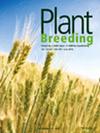Breeding dryland legumes for diverse needs: Using multi‐location trials and participatory variety selection to develop farmer‐preferred groundnut (Arachis hypogaea) and pigeon pea (Cajanus cajan) varieties
IF 1.8
4区 农林科学
Q2 AGRONOMY
引用次数: 0
Abstract
Agriculture in Sub‐Saharan Africa is primarily smallholder‐based, employing up to 60% of the workforce and accounting for 14%–23% of GDP. The smallholders grow crops for domestic and off‐farm markets, necessitating crop variety attributes for which trait mismatches may limit adoption. Indeed, improved variety adoption is varied and limited, especially for self‐pollinated crops, in part due to the mismatch in characteristics of commercialised varieties. The international research community leads breeding of varieties for under‐invested crops, especially legumes. These varieties are often resilient and productive, but the dynamisms in target agri‐food systems may limit their relevance. Gaining a better understanding of the trait profiles that crop value chain actors consider will increase their adoption. This study combined multi‐location trials and participatory variety selection (PVS) of pigeon pea and groundnut across different environments to evaluate the efficacy of both processes in the breeding of desired varieties. The present study shows improvement in the new materials regarding performance and preference by farmers. Additionally, PVS showed that men prioritised productivity and market‐enhancing traits, whereas women ranked food security traits highest.培育满足多样化需求的旱地豆科植物:利用多地点试验和参与式品种选择,开发农民喜欢的花生(Arachis hypogaea)和鸽豆(Cajanus cajan)品种
撒哈拉以南非洲的农业主要以小农户为基础,雇佣了高达60%的劳动力,占GDP的14%-23%。小农户为国内和场外市场种植作物,这就需要作物品种特性,而特性不匹配可能会限制其采用。事实上,改良品种的采用是多种多样和有限的,尤其是对于自花授粉作物,部分原因是商业化品种的特征不匹配。国际研究界领导着投资不足作物的品种育种,尤其是豆类。这些品种通常具有弹性和生产力,但目标农业食品系统的动态性可能会限制它们的相关性。更好地了解作物价值链参与者所考虑的特征特征将提高其采用率。这项研究结合了鸽子豌豆和花生在不同环境中的多地点试验和参与性品种选择(PVS),以评估这两个过程在培育所需品种方面的效果。目前的研究表明,在农民的表现和偏好方面,新材料有所改进。此外,PVS显示,男性优先考虑生产力和增强市场的特征,而女性则将粮食安全特征排在首位。
本文章由计算机程序翻译,如有差异,请以英文原文为准。
求助全文
约1分钟内获得全文
求助全文
来源期刊

Plant Breeding
农林科学-农艺学
CiteScore
4.40
自引率
5.00%
发文量
74
审稿时长
3.0 months
期刊介绍:
PLANT BREEDING publishes full-length original manuscripts and review articles on all aspects of plant improvement, breeding methodologies, and genetics to include qualitative and quantitative inheritance and genomics of major crop species. PLANT BREEDING provides readers with cutting-edge information on use of molecular techniques and genomics as they relate to improving gain from selection. Since its subject matter embraces all aspects of crop improvement, its content is sought after by both industry and academia. Fields of interest: Genetics of cultivated plants as well as research in practical plant breeding.
 求助内容:
求助内容: 应助结果提醒方式:
应助结果提醒方式:


